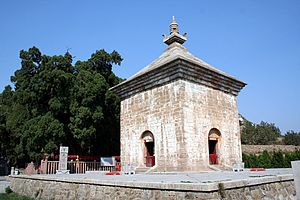611
This article needs additional citations for verification. (May 2019) |
| Millennium: | 1st millennium |
|---|---|
| Centuries: | |
| Decades: | |
| Years: |
|
| 611 by topic |
|---|
| Leaders |
| Categories |
| Gregorian calendar | 611 DCXI |
| Ab urbe condita | 1364 |
| Armenian calendar | 60 ԹՎ Կ |
| Assyrian calendar | 5361 |
| Balinese saka calendar | 532–533 |
| Bengali calendar | 18 |
| Berber calendar | 1561 |
| Buddhist calendar | 1155 |
| Burmese calendar | −27 |
| Byzantine calendar | 6119–6120 |
| Chinese calendar | 庚午年 (Metal Horse) 3307 or 3247 — to — 辛未年 (Metal Goat) 3308 or 3248 |
| Coptic calendar | 327–328 |
| Discordian calendar | 1777 |
| Ethiopian calendar | 603–604 |
| Hebrew calendar | 4371–4372 |
| Hindu calendars | |
| - Vikram Samvat | 667–668 |
| - Shaka Samvat | 532–533 |
| - Kali Yuga | 3711–3712 |
| Holocene calendar | 10611 |
| Iranian calendar | 11 BP – 10 BP |
| Islamic calendar | 11 BH – 10 BH |
| Japanese calendar | N/A |
| Javanese calendar | 501–502 |
| Julian calendar | 611 DCXI |
| Korean calendar | 2944 |
| Minguo calendar | 1301 before ROC 民前1301年 |
| Nanakshahi calendar | −857 |
| Seleucid era | 922/923 AG |
| Thai solar calendar | 1153–1154 |
| Tibetan calendar | 阳金马年 (male Iron-Horse) 737 or 356 or −416 — to — 阴金羊年 (female Iron-Goat) 738 or 357 or −415 |

Year 611 (DCXI) was a common year starting on Friday (link will display the full calendar) of the Julian calendar. The denomination 611 for this year has been used since the early medieval period, when the Anno Domini calendar era became the prevalent method in Europe for naming years.
Events[]
By place[]
Persian Empire[]
- Byzantine–Persian War: The Persian army under Shahrbaraz captures Antioch, and most of the remaining Byzantine fortresses in Syria and Mesopotamia. King Khosrau II is re-establishing a neo-Persian Empire, and intensifies his war effort. The Byzantine army, ruined by defeat and corruption, offers only half-hearted opposition.
Britain[]
- Cynegils becomes king of the West Saxons, or Wessex, after the death of his uncle Ceolwulf (according to the Anglo-Saxon Chronicle). He rules from 611 to 643 and shares power to some extent with his eldest son, Cwichelm, who may have been given Upper Wessex (approximate date).
By topic[]
Religion[]
- The Four Gates Pagoda, located in central Shandong Province (East China), is completed.[1]
Births[]
- July 7 – Eudoxia Epiphania, daughter of Byzantine emperor Heraclius
- Leo II, Pope of the Catholic Church (d. 683)
Deaths[]
- Arnoald, Bishop of Metz (approximate date)
- Ceolwulf, king of Wessex (approximate date)
- Comentiolus, Byzantine general (approximate date)
- Romilda of Friuli, regent duchess of Friuli (approximate date)
References[]
- ^ Wang, Eugene Yuejin (2005). Shaping the Lotus Sutra: Buddhist Visual Culture in Medieval China. University of Washington Press. p. 321. ISBN 978-0-295-98462-9.
Categories:
- 611